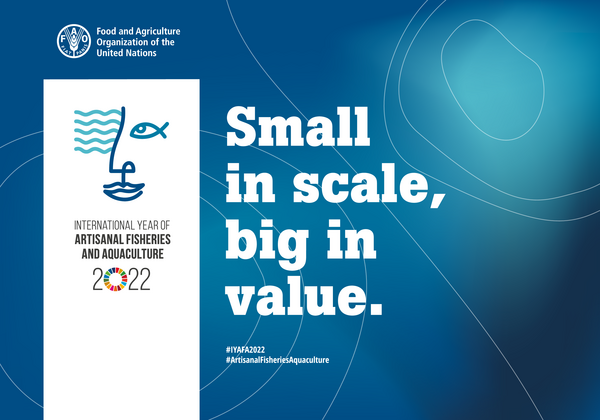 Read this article in French
Read this article in French- Share this article
- Subscribe to our newsletter
International Year of Artisanal Fisheries and Aquaculture
“Small-scale artisanal fisheries and aquaculture are small in scale, but big in value!” said the Director-General of the Food and Agriculture Organization of the United Nations (FAO) QU Dongyu at the launch of the International Year of Artisanal Fisheries and Aquaculture 2022 (IYAFA 2022) in November 2021.
A recent FAO WorldFish study indicates that the small-scale sector may account for the bulk of production considering that about 80 per cent of the world’s aquaculture production comes from developing countries, with the number of artisanal farmers being much higher than those employed at farm level in medium- and large-scale aquaculture.
According to the Global Action Plan of the IYAFA 2022, the objectives of the International Year of Artisanal Fisheries and Aquaculture 2022 are as follows:
“enhance global awareness about understanding of, and action to support the contribution of small-scale artisanal fisheries and aquaculture to sustainable development, and more specifically in relation to food security and nutrition, poverty eradication and the use of natural resources;”
and
“promote dialogue and collaboration between and among small-scale artisanal fishers, fish farmers, fish workers, governments and other key partners along the value chain, as well as to further strengthen their capacity to enhance sustainability in fisheries and aquaculture and to enhance their social development and well-being.”
The Global Action Plan of the IYAFA 2022 stands on 7 pillars:
- Pillar 1: Environmental sustainability: Use biodiversity sustainably for the longevity of small-scale artisanal fisheries and aquaculture
- Pillar 2: Economic sustainability: Support inclusive value chains for small-scale artisanal fisheries and aquaculture
- Pillar 3: Social sustainability: Secure social inclusion and well-being of small-scale artisanal fisheries and aquaculture
- Pillar 4: Governance: Ensure effective participation of small-scale artisanal fisheries and aquaculture in building and strengthening enabling policy environments
- Pillar 5: Gender equality and equity: Acknowledge that women and men in small-scale artisanal fisheries and aquaculture are equals
- Pillar 6: Food security and nutrition: Promote the contribution to healthy diets from small-scale artisanal fisheries and aquaculture in sustainable food systems
- Pillar 7: Resilience: Increase the preparedness and adaptive capacity of small-scale artisanal fisheries and aquaculture to environmental degradation, shocks, disasters and climate change
At the launch event, Maria Flachsbarth, Parliamentary State Secretary of the German Federal Ministry for Economic Cooperation and Development, sent a video message underlining the importance of the world’s seas and oceans as a source of food and employment. She explained how the German government has invested 130 million euro for resource management through initiatives combating illegal, unreported, unregulated fishing, support of various marine management plans and for strengthening local value chains.
(FAO/ile)
Visit the website of the International Year of Artisanal Fisheries and Aquaculture 2022 (IYAFA 2022)
Rural 21, Vol. 55 No. 4/2021: Tailwind for sustainable artisanal fisheries





Add a comment
Be the First to Comment